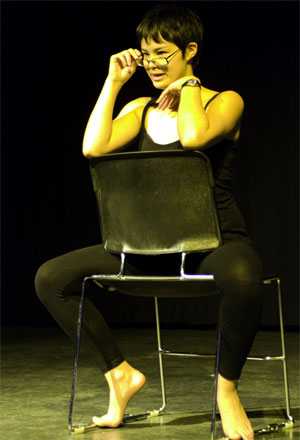 |
| Isabella Price is one of several women performing in the Vagina Monologues. (Josh Boyter Photo) |
More than half of us have one. The majority of the other half will make love to one. Most of us came into this world through one.
So why the taboo? Why is it that the slang and biological terms for the thing are so pejorative? Why is it that rape of women is a systematic tool of war? Why is it that young girls and women face different levels of acceptability when it comes to talking about themselves and pleasuring themselves? Why are slang words for the penis so mainstream while words for vagina continue to be the dirtiest of the English language?
These are the questions the Vagina Monologues aim to address. The monologues were first written by Eve Ensler in 1996 to celebrate and help women understand the role of that thing between their legs. Since then, the show has been put on all over the world by professionals and non professionals to raise money and awareness to stop violence against women.
I decided to take the journey this year and join the group at ║┌┴¤│ď╣¤═°putting on the monologues. This year, they're┬ádirected by Hayley Gray, produced by Silver Bonnick and performed by a group of women from Dalhousie, King's and the Halifax community who share a sense of common purpose to talk about vaginas.
My castmate Candice Cascanette performs the monologue "Reclaiming Cunt," a monologue that aims to take back the dirty word and transform its meaning.┬áShe told me that taking on this piece has ÔÇťopened her eyes to the fact that females are conditioned to hate this wordÔÇŁ and to ask why this is so.┬áShe is now attempting to use the word daily despite the aversion she faces from peers.
Director Hayley Gray said she wanted to be involved in the production because of ÔÇťhow much doesnÔÇÖt get said about vaginas.ÔÇŁ She is blown away by the fact that almost every woman can tell you one moment that she felt intruded or violated by a man, despite not actually being sexually abused.
Emilie Bourque, a KingÔÇÖs journalism student. is in the production for the sixth time. She does it every year for two reasons; one for the cause and second for herselfÔÇöÔÇťto remind herself that vaginas are beautiful.ÔÇŁ She says by participating in this production she has become to see her vagina differently and has seen the same change in other castmates.
I am in this production because I want to challenge the taboo. I want to lend my voice to the stories of other women who have had a harder time than me in coming to terms with and appreciating their vaginas. I am outraged that womenÔÇÖs sexuality and biology have been marginalized and used as tools for violence, hate and abuse and have been taken away from us and from our own meanings of ourselves.
I urge you to come see the production, especially if you are uncomfortable with the subject. We will be performing the Vagina Monologues Tuesday. Feb. 17 and Wednesday, Feb. 18, 7 p.m.┬áin the McInnes Room. Tickets ($10 for students, $12 for non-students) can be┬ápurchased in advance through the ║┌┴¤│ď╣¤═°WomenÔÇÖs Centre or at tables around campus. They'll also be available at the door on the nights of the show.
All proceeds go to groups helping end violence against women, including Bryony House, Avalon Sexual Assault Centre, Alice Housing and Witness N.S.
For more information about the global V-day project visit :
